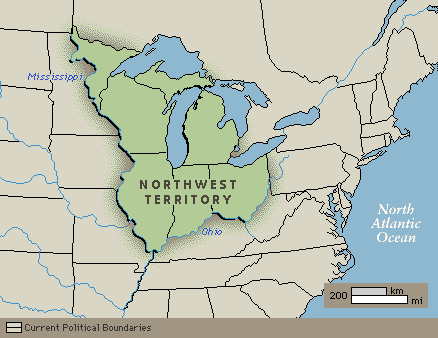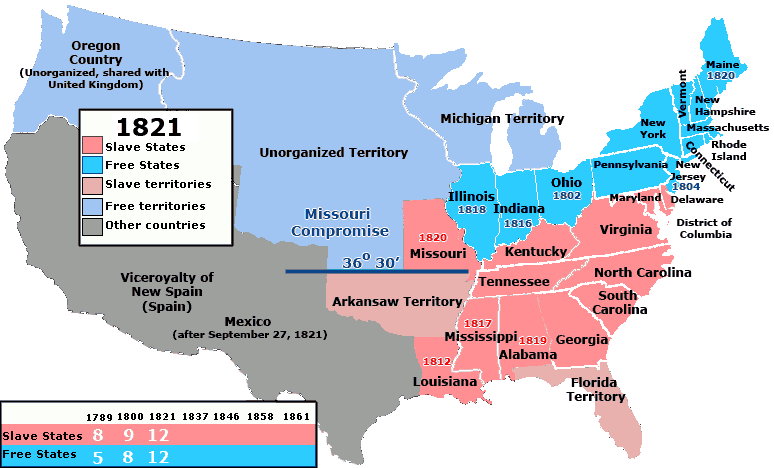American Civilization | The Road to The American Civil War
Introduction and Part One
Introduction
The assertion that « all men are created equal » was still in 1800s more an unfulfilled promise than a statement of political fact; and the outbreak of the Civil War is rooted in the failed compromises over slavery. The United States’ westward /ˈwestwəd / expansion led to debates about the fate of slavery in the newly acquired territories: should the western territories become slave states or should they become free states?
|
|
This was a question of political balance between the north and the south. In 1803 President Thomas Jefferson purchased /ˈpɜːtʃəst / the territory of Louisiana from the French government. It doubled the size of the country, and even if Jefferson believed that westward expansion was the key to the nation’s health, this new territory soon turned out to be a threat to the new republic.
|
Contenu reservé aux membres | Member Only ContentConnectez-vous pour lire la suite | Sign in to read more
|
If you are already logged in, please scroll down. | Si vous êtes déjà connecté, veuillez descendre.
|
|
|
Part One | Territorial Expansion: what to do with the west?
|
Ci-contre, les articles 5 et 6 de la Northwest Ordinance. Article 5 énumère les conditions pour que le territoire soit divisé et que ces divisions deviennent des états. L'article 6 interdit l'esclavage et la servitude, à l'exception des travaux d'intérêt général.
|
The Northwest Ordinance of 1787 prohibited / outlawed slavery north of the Ohio /əʊˈhaɪəʊ/ River. It made the Ohio River a natural dividing line between the free and slave states of the country.
Art. 5. There shall be formed in the said territory, not less than three nor more than five States; (…). And, whenever any of the said States shall have sixty thousand free inhabitants therein, such State shall be admitted, by its delegates, into the Congress of the United States, on an equal footing with the original States in all respects whatever, and shall be at liberty to form a permanent constitution and State government: Provided, the constitution and government so to be formed, shall be republican, and in conformity to the principles contained in these articles; and, so far as it can be consistent with the general interest of the confederacy, such admission shall be allowed at an earlier period, and when there may be a less number of free inhabitants in the State than sixty thousand. |
In 1820, Missouri /mɪˈzʊri/ (a territory located west of the Mississippi river) wanted to become a state. It was clear that many in the territory wanted to allow slavery. The territory was part of the huge land bought /bɔːt/ from France in the Louisiana Purchase, and was renamed to avoid confusion with the newly admitted state of Louisiana in 1812.The issue was that if Missouri was admitted to the union as a slave state, it would give more power to the south.
Thus, a compromise was reached: in order to maintain the balance of power in Congress, Missouri would be accepted as a slave state and Maine as a free state. Furthermore, Congress banned slavery in all of the former Louisiana Purchase lands (with the exception of Missouri) north of Missouri’s southern boundary.
Thus, a compromise was reached: in order to maintain the balance of power in Congress, Missouri would be accepted as a slave state and Maine as a free state. Furthermore, Congress banned slavery in all of the former Louisiana Purchase lands (with the exception of Missouri) north of Missouri’s southern boundary.
In 1850 Congress had to find / come up with / work out another compromise in order to preserve / sustain the balance of power between the slave and free states in Congress.
Main points of The Compromise of 1850:
- admitted California to the union as a free state
- established New Mexico and Utah as territories that could decide thanks to popular sovereignty (the decision was left to the inhabitants of those territories)
- allowed slavery in Washington DC but abolished the slave trade.
- The Fugitive Slave Act : federals agents could bring back fugitives (escaped slaves) from the north to the south. This was very shocking and controversial at the time. The act also imposed penalties to anyone who tried to help them gain freedom.


